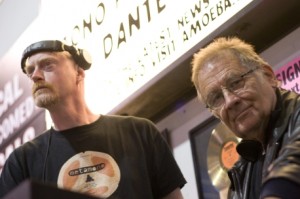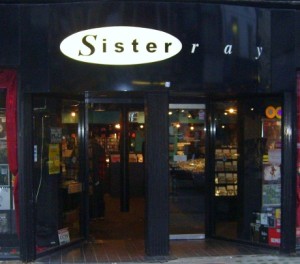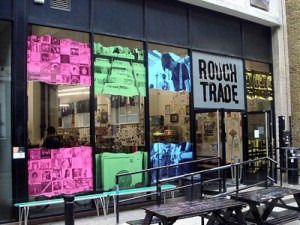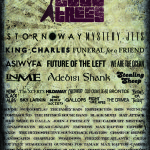As part of our month long Record Store Day jubilations and postulations, spirited electronic alchemist, teacher and producer Jono Podmore deliberates on the future of the tactile experience; offering both derision at the, all-too common stereotypical, snobbery of certain record store employees, and musing on his own personal exchanges over the counter at a revered series of iconic vinyl meccas!
Always on the fringes, yet working side-by-side with some of the most exalted and influential pioneers behind and beyond the electronic sphere, Podmore has recorded under a number of pseudonyms including Kumo. He’s also worked alongside Can’s magical keyboard operative and composer, Irmin Schmidt for well over a decade on the Masters of Confusion and Axolotl Eyes collaborations. Podmore recently finished work on compiling and arranging the fated Cologne groups Lost Tapes – one of last years most anticipated releases, given a 5 star rating by us.
In the last year alone, Jono Podmore has released a trio of tapes, singles and EPs under the moniker of Metamono, which we described thus: “Tying their pertinacious agit manifesto to the increasingly soulless and limp mast of electronic music, the experimental scion trinity of Bomb The Bass collaborator Paul Conboy, fine artist Mark Hill, and Jono Podmore , have fashioned an odd radiophonic synthesis of atavistic futurism and compositional sophistication on their last two releases – the Tape EP and Parcel Post 10″
Last month Podmore once again collaborated with Schmidt, former Can drumming wizard Jaki Liebezeit and electro producer Burnt Friedman, for the ‘avant-far’ traversing soundscape ‘supergroup’, Cyclopean.
I’m sure you’ll find his credentials are all in order. So without further ado…

Living in London I’m completely spoiled for choice of independent record shops. Not only that but stores of such a variety of flavours and style that it’s obvious what a vibrant and complex cultural sector independent music is. If I’m showing visitors around my city I often include an hour or so dipping into the record shops in Soho – Phonica, Black Market, Sister Ray, Sounds of the Universe etc. – just as a way of demonstrating the diversity and complexity of London.
But although not located in Soho, my favourite independent record store in London is Rough Trade East. Spacious, including a café, performance space and even the modular synth shop Schneider’s Büro, there’s plenty to keep you browsing on and on until the visa card is creaking. The range of music is enormous – lots of vinyl but also the ubiquitous CD racks, listening posts and turntables so you can stand nodding your head (or stroking your chin depending on genre) a little self-consciously before making another purchase.
I’ve done a couple of in-store DJ sets in RTE, once for a record store day on which me and my dear old father-in-law, Irmin Schmidt from Can, were playing tracks from our new album at the time: Axolotl Eyes. The central image of the artwork for that album, one of the best looking records I’ve ever released, is of two humans – male and female – with the heads of ‘axolotls’. We took one of the beautiful papier-mâché heads down to the store for the show and hung it on a pillar – where it hangs to this day. Not sure if the record is still in the racks but the head remains.
In the process of all this and also taking in Metamono vinyl to sell in the shop, I’ve got to know some of the staff and now feel pretty at home there; a sensation which for me is a first, yet a sensation that fails to dawn on the majority who’ll miss out on this experience.
My first proper experience of independent record stores was Probe in Liverpool. A classic post-punk cultural hub it dealt in both records and fuck-off attitude in spades. As an eager thirteen-year old in 78, no matter how much I wanted a particular 7”, if it wasn’t in the rack I was far too intimidated by Pete Burns, replete with black haptic lenses, full gender bent regalia and with a similarly expansive mouth to boot to dare ASK for it.
In 77/78 my mother was asked to buy a copy of New Boots and Panties by Ian Dury and the Blockheads as a birthday present. After walking out of the high street record shops empty handed she was advised to go to Probe. As a strong willed middle aged matriarch in her prime in that most matriarchal of societies that is Liverpool, she walked straight up to the counter and asked the luxuriant Mr. Burns if they stocked the album. “I’ve got the new boots if you’ve got the panties, darling” came the droll reply. Irresistible I suppose. Unfazed and doubtless giggling like a teenager, Mum left the shop with the album and an anecdote. A lot of fun, but not exactly the epitome of a sound business model.
Nevertheless some of the most important records in my collection were bought in Probe: Joy Division, Mark Stewart, Public Enemy, James Brown, Kraftwerk (the list could go on and on!).
But this cliquey and intimidating approach to retail not only persisted it perhaps reached its zenith in the 90’s with the DJ culture. Record shops became one of the sources of the material that DJs would make their income with. What happened was that the coolest, bangingest, most phuturistic 12”s would stay strictly behind the counter. What was in the racks was old filler existing only as a signifier of the quality behind the counter. The staff would busy themselves skinning up and perfecting their DJ ‘skillz’ in front of an audience of drooling hopefuls. Hopeful of being DJs, of being stars – but often-just hopeful of buying a bloody record.
As a producer, programmer, artist and infrequent DJ I would go unrecognized into shops in the 90s and be shooed away from buying my own records! Sometimes standing endlessly ignored at the counter to ask if copies of my latest 12” were selling I would simply give up and go back to the studio to make some more fodder for these condescending clowns. Again of course, not exactly the epitome of a sound business model and ‘surprise surprise’ most of these shops have gone or changed hands multiple times – despite fluctuating fashions and formats.
So if you are intimidated away from buying your music in the few shops that stock it, where do you go? Enter, the Internet….
A good friend of mine used to work for the reggae label Greensleeves – which has sadly now been consumed by New York based VP. I was shocked to find out how much the business relied on mail order – as much as download and traditional distribution. For him it made perfect sense: the vast majority of the audience for reggae in the U.K are white and largely middle-class. People simply too intimidated to make the trek to the one record shop in town entirely staffed by black people and appear like the ultimate culturally imperialist dork of all time by pronouncing Dr. Alimantado wrongly. Best press the button and wait for a brown paper parcel to arrive in Acacia avenue.
Does specialist necessarily have to mean exclusive or elitist? A shopful of product you’ve never imagined existing should appear like a treasure trove, not an intimidating fortress wagging a finger at you for your ignorance – or at worst actively dismissing you and your business on the basis of obscure peer group allegiances.
These issues simply don’t cross your mind when shopping in the lonely, pale glow of your PC. The success of Boomkat is a fine example of this. Offering a multitude of independent product in physical form and as download, Boomkat cannot offer you the smell of coffee, the throb of a mishandled modular synth, the chance to meet your future bass-player, the knowledgeable advice that RTE can, but you will never feel like an idiot, a cultural beast of prey buying black music, or simply outré, shopping online.
But the comparison between Boomkat and the physical stores goes deeper than that. No store front other than a website (which all the physical stores run anyway) cuts their overheads enormously. Amidst the evils of Tory austerity this means that Boomkat can take a handful of minor risks. So for a record company like Instrumentarium, whose output is to date a 10”, a C30 cassette and a 7”, it’s important to us that Boomkat will buy 10 copies of our releases outright. They know they won’t sell them all in a day, but having the product on the shelves in the warehouse looks good for the roster and they know it will go in the medium term – especially when the long awaited Metamono album is the enormous hit it promises to be in the autumn. But the shops can’t take that risk. To have £15 locked up in stock that they can’t shift immediately is nibbing at the edge of their margins.
Of course with a distributor some of that £15 is carried by them and passed back to the label if the product doesn’t sell – so the risk for the shop is much smaller. So it makes sense for an independent record company to use a distributor to share some of the risk in getting their product into the independent record store – doesn’t it? There’s a catch. Other than a few notable exceptions, the bigger distributors are owned, either partly or wholly, by the majors. I kid you not. There’s a strong chance that banging limited edition indie 10” in a handmade sleeve you bought in support of your favourite indie store was supplied by Warner Bros., Universal or EMI.
The majors love independent record stores. They can test their product via them and even break new acts. And what’s even better – they behave. They are always cash strapped so they are never going to make waves with their most important and supportive distributors. But conversely it’s not in the interest of the majors to let the independent record companies succeed at all. The model is to allow an independent label enough oxygen to breathe in order to find, support and develop new talent and then cherry pick these as they begin to become viable in the majors terms. Part of that model is to make sure the artist will never succeed unless they sign to a major – to ensure the independent can’t deliver the promotion and distribution the act needs to fulfil its potential. They achieve this through having a stranglehold on the distribution network. I know of a cases where a tiny independent, a family business with a couple of exciting acts, has been unable to break even on physical releases because the distributor (owned in this case by Warner) were selling off their product at a fraction of the dealer price just to get it off their hands. A policy that has its origin in a more sinister attitude to independents: they are the majors’ unpaid A&R up to a point, and then they are simply competition for market share and need to be crushed.
There are a few ways an independent record company get around this – fortunately.
Firstly – SOR: Sale or Return. You turn up at the shop with a bag full of your records and a couple of reviews, press release etc. and ask to speak to the main buyer. You show them your records and tell him/her the dealer price and the suggested retail price. He/she has a look – perhaps even a listen, does some arithmetic and says: “I can shift five of these” (or “sorry – our customers are looking for something a bit more shit”). They take your beautiful records that you’ve paid for every aspect of, to the extent of feeding your kids on the goldfish. No money changes hands. The records then sit unloved at the back of the rack for a fixed period because the shop has made zero risk and is therefore under no pressure to sell the things. At the end of the allotted period you contact the shop. They say, “We’ve sold three”. You go in, collect the dealer price for each record (out of the till usually) and collect the two unsold ones. They are unsold but they may well be played, handled, dropped etc. In an act of defiance you take the £13.50 you’ve earned immediately to the pub.
Another method is to avoid the shops entirely and sell via your website and at gigs. This is a time-honoured method and many unsigned bands have made good livings under the radar of the majors using this method for donkey’s years. The downside is you sell fewer copies, but the upside is you get ALL the profit. As a rule of thumb if you sell out of your 500 copies of a 12” via the usual distributor/shop method you might just break even. Going directly to consumer you’ll break even after 200 and the rest can be ploughed back into the next release while you still have stock for collectors and completests to pick up later. This is no mystery or new methodology but strangely our privileged little dorm mates at the majors only picked up on it in the last couple of years, when they realised “Hey! You can SELL stuff on the internet!!!” The astonishing new method is direct to consumer – ‘D2C’, guys, get with the program, love the acronym!! Fortunately they are showing the same incompetence and arrogance in this arena as they do in others so there’s very little to worry about, yet. In the meantime do a search on D2C music and see which names crop up.
The future is still a little opaque, but there are a few certainties. People like physical product, particularly vinyl. The CD will be superseded by the download. The majors will, in the process of buying each other, become one enormous monopolised ‘moloch ‘of incompetence and barely legal business practice – if that hasn’t happened already. Independents will continue to exist and their product will find its way out on any platform available, whether major owned or not. Only a tiny percentage of musicians will be able to live exclusively from their music.
Then there are a few possibilities. Independent shops could disappear in the way HMV/Virgin etc. went to the wall. They could become physical store fronts for sophisticated blogs: holding very little stock and employing a skeleton staff, collating D2C pages on labels own websites, for a cut of course. They could forget the cut and just survive from the advertising revenue the brand brings in. They could survive entirely from the 2nd hand market.
It’ll doubtless be a mixture of these, but for now, cliquey nonsense and teenage peer-pressure aside – let’s support and defend the independent sector as fiercely as we can. It’s simply where the best music and best ideas are.
Jono Podmore.
Metamono will be twiddling the dials and searching for the soul in the machine at the Orb’s 25th anniversary ‘Adventures Beyond the Ultraworld and uforb’ shindig, this Friday (April 5th). Full details can be found by clicking the handy image below.









